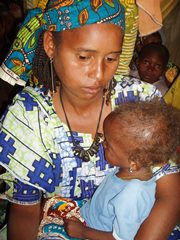|
Central African Republic - "The situation is getting worse and worse" "The situation is getting worse and worse." These were the words of a local missionary priest describing the tragic conflict in the Central African Republic. Father Aurelio Gazzera made his comments about the dramatic worsening of the situation in the Diocese of Bouar in the north of the Central African Republic while speaking with international Catholic pastoral charity Aid to the Church in Need (ACN). Gazzara reported that many people have been killed and their bodies are still lying in the streets. “Apocalyptic scenes have been played out.” Since August, 6,500 refugees have arrived in Bozoum, where one of the Carmelites’ five mission stations is located. Many thousands more people are in flight. Many of those fleeing have been hiding out in the bush for fear of the rebels, Father Gazzera reported. “They are deeply traumatized and have lost everything.” In recent days there has been heavy fighting in many places around the town of Bossangoa, in which at least 60 people have lost their lives. More than 30,000 people, some 80 percent of the inhabitants, have fled. “The situation is very confusing. On the one hand, it is said that supporters of the deposed former President Bozize have been fighting against the Séléka; on the other hand, an eye-witness who fled on foot from Bossangoa to Bozoum reported to me that it all began with fighting between the Séléka and young inhabitants of the town,” Gazzera explained. The situation is an “extremely dangerous mixture of different armed groupings and an increasing propensity to violence by the Séléka rebels” who seized power in the country in March of this year. The missionary, who has been working in the Central African Republic for twenty years, is very concerned about the worsening conflicts between Muslims and Christians. Until recently, according to Gazzera, the people got on well together. But the arrival of Muslim rebels from Sudan and Chad, who only speak Arabic, has “destroyed much.” In the attacks of recent days, in a similar pattern to what generally occurs when the Séléka strike, “not one single Muslim house was burned down.” There have even been numerous cases where young Muslim people have pointed out to the rebels which buildings and facilities they should burn down or loot. “It is as if the coup in March has brought out the worst that is in people’s hearts,” the Carmelite complains. “But even now, reconstruction will take years: the reconstruction of buildings, but also, what is even more important, the inner reconstruction of the people.” The people feel bitter, but they also bear their burden with great dignity, the priest said. Despite everything, one sees no hatred or anger against those who have brought these sorrows upon them. But the people are also very tired, because nothing is working, according to Father Gazzera. The state is absent. People fear the future and cannot see any light at the end of the tunnel. And it seems as though nobody hears all of this and that nothing is being done to solve it. At the same time, the missionary said that there is still great faith: the sentence that one hears most often is ‘NZAPA A YEKE’, which means ‘God is there.’” |
|
|

 “Events have occurred thick and fast in recent days, and the aggressiveness of the rebels has increased,” said the Italian Carmelite, who claimed that more than 3,500 houses have been burned down in the town of Bohong alone.
“Events have occurred thick and fast in recent days, and the aggressiveness of the rebels has increased,” said the Italian Carmelite, who claimed that more than 3,500 houses have been burned down in the town of Bohong alone.